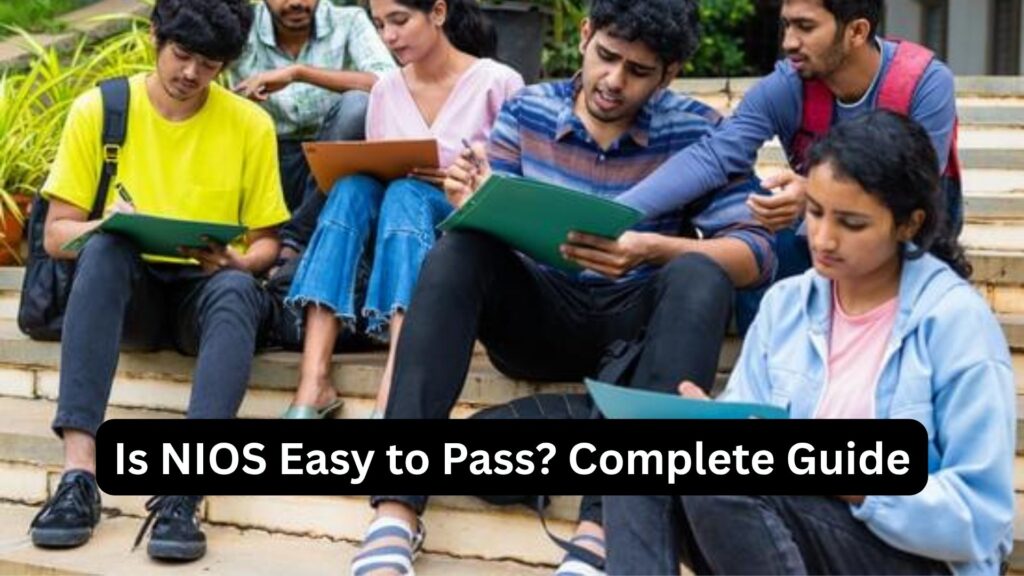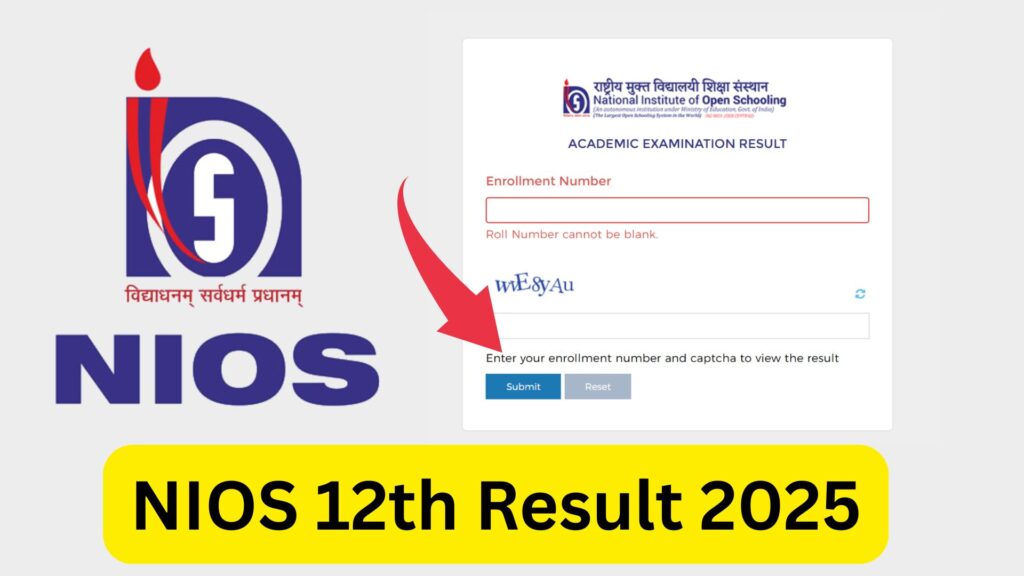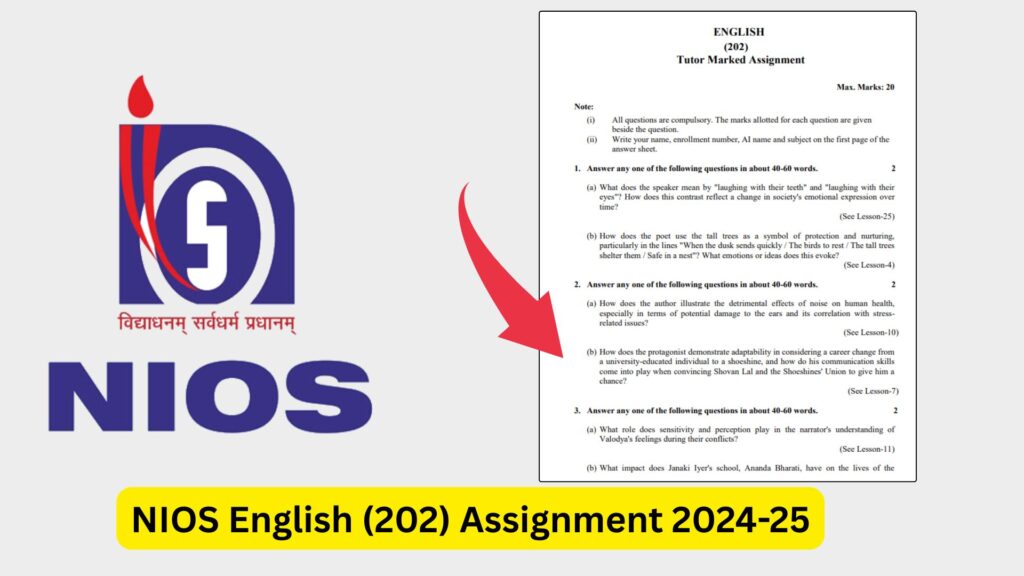Is NIOS Easy to Pass? When students consider alternative schooling options in India apart from traditional boards (like CBSE, ICSE, or state boards), the National Institute of Open Schooling (NIOS) often emerges as a popular choice. Many wonder: Is NIOS easy to pass? The short answer is: the relative ease of passing NIOS depends on many factors—student’s discipline, study habits, subject selection, guidance, and exam strategy.

What Is NIOS?
The National Institute of Open Schooling (NIOS) is an autonomous institution under the Ministry of Education, Government of India. Its official website is https://www.nios.ac.in/.
NIOS provides flexible, alternative schooling for learners who cannot pursue regular schooling. It offers:
- Secondary (equivalent to Class X) courses
- Senior Secondary (equivalent to Class XII) courses
- Vocational, Life Enrichment, and community-oriented programmes
- Open Basic Education (OBE) for elementary level learners
- On-demand examinations, and multiple exam chances
NIOS’s mission is to provide inclusive education and reach learners who, for whatever reason (distance, cost, work, health), cannot attend conventional schools.
Because of its flexible system (choice of subjects, exam modes, self-study orientation), many students find NIOS to be a more “friendly” alternative. But whether it is “easy” is a more nuanced question.
How Does NIOS Differ from Conventional Boards?
To understand whether NIOS is easier, it helps to note the key differences:
| Feature | Conventional Boards (CBSE, State, ICSE) | NIOS |
|---|---|---|
| Fixed academic calendar | Exams once or twice a year | Multiple exam chances, flexible scheduling (including on-demand) |
| School-based continuous assessment and regular classes | Tight schedule, frequent classes | More self-study, fewer classes, learners often independent |
| Rigid syllabus and timetable | Students must follow school timetable | Flexibility to choose subject combinations and timing of exams |
| Peer environment, school support, regular teachers | Structured support system | Depends heavily on self-motivation or external tutors |
| Pressure of school attendance, discipline | Strict attendance and discipline | More lenient attendance norms (depending on study centre) |
Because of these differences, many students perceive that NIOS offers less pressure, more flexibility, and hence (subjectively) greater “ease.” However, that does not automatically translate to guaranteed success without sufficient effort.
Is NIOS Really Easy to Pass? The Key Factors
Whether NIOS is easy to pass depends on multiple interrelated factors. Below are the main ones:
1. Student’s Self-Discipline and Motivation
NIOS gives students significant autonomy. There are fewer structured class hours, and much depends on how disciplined the learner is to follow a study plan. If a student lacks self-motivation, procrastination could pose serious hurdles.
2. Choice of Subjects
The selection of subjects matters. Some subjects are more scoring or conceptually easier (for a particular student) than others. If one chooses heavy or difficult subjects (like mathematics, chemistry, physics) without strong grounding, it becomes tougher.
If one chooses subjects aligned with one’s strength (languages, social sciences, vocational subjects), the chances of performing well increase.
3. Availability of Study Material & Support
NIOS provides study materials, assignments, and e-services via its portal. But the quality and clarity of resources, plus the availability of tutor support or coaching, play a huge role. If a learner can access good guidance or peer groups, passing becomes easier.
4. Exam Strategy and Practice
Knowing the exam pattern, past papers, marking scheme, and practicing with mock tests helps immensely. Many students who succeed with NIOS do so by rigorous practice and targeted preparation.
5. Time Management
Because of flexibility, students might delay exam preparation believing they have time. Mismanagement of time or leaving topics for late are common pitfalls. Those who plan well and pace themselves find NIOS easier.
6. Number of Attempts / Chance Flexibility
NIOS allows multiple attempts; if a student fails once, they can reappear. This cushion reduces the pressure compared to conventional boards where failing might require repeating a full year. This factor raises the perception that NIOS is easier.
7. Grading/Passing Criteria
The minimum passing marks and how internal assessments (assignments) are evaluated also impact ease. If passing criteria are moderate (not extremely stringent), it helps. But NIOS also expects learners to meet certain practicals or assignments.
Advantages That Make NIOS “Easier” for Many
Here are some advantages of NIOS that tilt the balance toward “easier to pass,” for disciplined learners:
- Flexible Exam Schedule: Learners can choose exam sessions and subjects at different times.
- Multiple Attempts: Reappear options reduce fear of failure.
- Choice in Subjects: Students can pick subjects that suit their strengths.
- Distance and Open Structure: Useful for working students, adult learners, or those with constraints.
- Self-Paced Learning: You can go faster or slower according to your own pace.
- Support via E-Services: NIOS offers online study materials, video lectures, assignments, and tutor support.
However, these advantages require the student to be proactive. Without initiative, those freedoms can become sources of procrastination or confusion.
Challenges That Can Make NIOS Hard
At the same time, some features may make NIOS tricky or demanding:
- Need for Self-Motivation: No fixed class hours, so learners may lack structure.
- Isolation: Lack of peer group or face-to-face teacher support can reduce interaction.
- Limited Clarification: Doubts might not be cleared immediately.
- Time Lag: Delays in receiving study materials or assignment feedback.
- Exam Stress Accumulation: If a student leaves too much for the last moment, it becomes overwhelming.
- Accountability: No immediate teacher supervision.
- Assignment Work / Practical Components: Neglecting these can affect internal assessment or project marks.
Thus, while NIOS offers flexibility, it also demands higher internal motivation and planning.
Tips to Make Passing NIOS Easier
To maximize your chance of success under NIOS, here are some proven strategies:
- Make a Study Plan / Schedule
Allocate fixed hours each day for different subjects. Treat it like regular school routine. - Start Early
Don’t wait until the last moment; begin revision and concept consolidation well in advance. - Choose Your Subjects Carefully
Pick subjects that interest you or where you already have some strength; avoid too many heavy combinations unless confident. - Use Official Study Material & Extra Resources
Download and study from NIOS’s official study materials and supplements. Use notes, video lectures, and reference books. - Solve Past Papers / Sample Papers
Practice previous years’ question papers and time yourself. Understand marking schemes. - Regular Review and Revision
Keep revisiting topics rather than studying them once. Use flashcards, summaries, or mind maps. - Complete Tutor-Marked Assignments (TMAs) Diligently
Internal assessment or assignment marks can be crucial—don’t skip them. - Seek Guidance / Coaching Where Necessary
If unclear about something, get help from tutors, online coaching, peer groups, or teachers. - Stay Consistent
Rather than long sporadic study sessions, short regular study is more effective. - Maintain Health / Avoid Burnout
Make sure to rest, sleep well, stay motivated, and manage stress.
When these are followed, many students find NIOS quite manageable.
Important Links & Information of NIOS
Below is a table listing useful links and essential information for NIOS learners:
| Topic / Description | Link / Information |
|---|---|
| NIOS Official Website | https://www.nios.ac.in/ |
| Admission & Registration Portal | Available via “Learners Corner → Admission” on official site |
| Study Material / Course Content | Accessible via “Learners Corner → Study Material” on official site |
| Tutor Marked Assignments (TMAs) | Via “Learners Corner → Tutor Mark Assignment” |
| e-Services (Digital services) | Via “Learners Corner → e-Services” |
| Examination & Results | Via “Programmes → Secondary & Senior Secondary → Examination / Result” |
| On-Demand Examination | Via “Programmes → On Demand Examination” |
| Vocational Programs | Via “Programmes → Vocational / Life Enrichment” |
| Open Basic Education (OBE) | Via “Programmes → Open Basic Education (OBE)” |
| Contact / Help / Regional Centres | Via “Contact Us / Regional Offices” links on official site |
| Fake Website Warning & Notices | Available under “Notification / Important Notice about Fake Website” on official site |
(Note: The above links are accessible through navigation menus on the official website. Learners should always start from the homepage and navigate via sections like “Learners Corner”, “Programmes”, “Notification”, etc.)
Is NIOS Easier to Pass? — Perspectives & Case Examples
From interviews and anecdotal evidence, many students who’ve passed NIOS say they found it more forgiving than conventional boards—but that’s contingent on how seriously they took the course.
- Some students cite that fewer hours of rote learning and more emphasis on understanding helps them retain concepts better.
- Others note that since failures can be made up by reattempts, the pressure is reduced.
- But negative cases include students who procrastinated, felt disconnected, or lacked clarity and ended up failing or scoring low.
So, the perception that NIOS is “easy” often comes from comparisons with the rigid structure and high-pressure environment of regular school boards. But in reality, passing NIOS is neither a walk in the park nor an insurmountable hurdle—it’s just different.
FAQ about Is NIOS Easy to Pass?
What is the pass mark for NIOS exams?
The passing marks can vary by subject, but generally, you need to secure minimum qualifying marks (often around 33% in theory papers). Also, internal assessments or assignments (TMAs) may have passing criteria.
How many times can I attempt NIOS exams?
NIOS offers multiple examination sessions (typically twice a year for regular exams) and on-demand exams. You can reappear for failed subjects in subsequent sessions.
How are assignments (TMA) important in NIOS?
TMAs carry internal assessment weight. Failing or not submitting assignments may affect your total score or eligibility to appear for exams.
Can I switch to NIOS mid-way (after leaving regular school)?
Yes, many students switch to NIOS after discontinuing regular schooling. You must follow the admission procedure and subject choice rules.
Are NIOS certificates recognized?
Yes, NIOS certificates for Secondary and Senior Secondary are recognized by many universities and institutions. They are considered equivalent to board certificates in India.
Do I need to attend classes for NIOS?
NIOS has flexibility: some study centres may offer contact classes or counselling, but attendance is generally not as rigid as in regular school boards.
Do I need to appear for all subjects in one session?
No. You can choose to appear in some subjects in one exam session and others later, depending on your readiness.
Is self-study sufficient or do I need coaching?
Many students succeed via disciplined self-study. But for difficult subjects or for doubt clarification, coaching or tutor guidance helps significantly.
What is On-Demand Examination in NIOS?
On-Demand Examination allows learners to take exams as and when they are ready (subject to scheduling) rather than waiting for fixed exam cycles.
Conclusion
So, is NIOS easy to pass? The answer doesn’t lie in a simple yes or no. For some motivated learners, NIOS can indeed seem “easier” because of its flexibility, multiple attempts, and self-paced structure. However, this perceived ease vanishes if the student lacks planning, discipline, or access to good support.
To succeed in NIOS, you must take responsibility for your learning: set a schedule, choose subjects wisely, use resources, practice thoroughly, and stay consistent. The flexibility that NIOS offers is a double-edged sword — it can make things easier if used smartly, or harder if mismanaged.
If you want, I can also suggest a month-by-month study plan or a subject-wise strategy for NIOS. Would you like me to prepare that for you?

